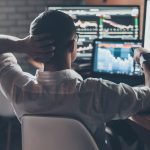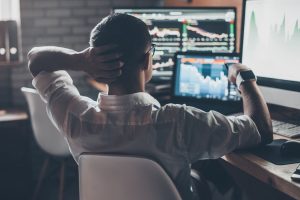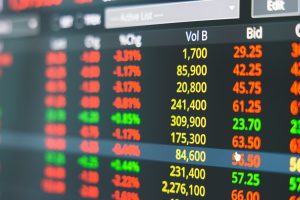What if you could buy shares today of hugely successful companies – with more than enough room to grow – for a fraction of their current share price?
Buy low, sell high, they always say.
While I don’t have a coupon that you can give to your broker to slice 5%, 10%, or 15% off a given stock’s share price, a closed-end fund does a similar trick.
Very few can say no to a good “sale.”
Unlike regular mutual funds that always change hands at their exact net asset values (NAVs), closed-end funds can trade above or below their NAVs, depending on investor demand for them.
Since closed-end funds issue limited amounts of shares, their prices after the initial issue are set by whatever investors are willing to pay. That means they can trade at a discount or a premium to their NAV.
Typically, closed-end funds trade close to NAV during bullish phases but then trade at deep discounts during bearish phases when panicked investors are dumping stocks… and that’s exactly what’s been happening with the stock I want to talk about today.
And while it’s not a “pure play” on the burgeoning artificial intelligence revolution, a sizable portion of its holdings play right into this megatrend…
“Scary” Accurate Stock Price Predictions
What if you could accurately predict stock prices one month in the future to within a percentage point? Well, our breakthrough A.I. algorithm called An-E (pronounced Annie, short for Analytical Engine) can do exactly that. In fact, backtests show An–E’s done it many times. And on Tuesday, Jun. 20, at 8:00 p.m. ET, we’re revealing An-E in a must-see presentation. Reserve your spot here.
A Leading Authority
Although The Korea Fund (KF) holds only Korean companies, many of them are global leaders in tech industries like semiconductors, electric vehicles (EVs), energy storage, and smart devices. In total, tech stocks represent about half the portfolio.
Samsung Electronics Co. Ltd. (oo5930.KS) and SK Hynix Inc. (000660.KS) are the Korea Fund’s first- and second-largest holdings. Together, they represent 30% of the fund.
As one of the world’s leading semiconductor manufacturers, Samsung produced about 16% of the world’s chips last year. The company could become an even more dominant player, as it rolls out its next-generation AI-capable chips.
In early 2024, Samsung will begin selling its most advanced three-nanometer process node semiconductors to companies like NVIDIA Corp. (NVDA), QUALCOMM Inc. (QCOM), International Business Machines Corp. (IBM), and Baidu Inc. (BIDU).
Samsung is already the world’s top manufacturer of memory chips. Its market share of the global DRAM market stands at 45.1%. Its smaller rival SK Hynix Inc. ranks second with a 23.9% share. Combined, these two Korean chipmakers account for a massive 69% of the global market.
Samsung is also a powerhouse in the smartphone market. In an industry that Apple seems to dominate, Samsung actually wears the crown. It is the largest global smartphone manufacturer, based on units sold. Based on revenue, Apple holds the leading share of 30.4%, while Samsung runs a close second with a 26.1% share.
All in all, Samsung has been delivering strong revenue and profit growth for several years running.
LG Chem Ltd. (051910.KS) is the Korea Fund’s third-largest holding, representing 5.3% of the portfolio. This industrial giant’s 81.8%-owned subsidiary, LG Energy Solution Ltd. (373220.KS), is the world’s second-largest manufacturer of EV batteries.
And since two other Korean companies, SK Innovation Co. Ltd. (096770.KS) and Samsung SDI, rank among the Top 10 battery makers worldwide, the combined market share of the three South Korean EV battery makers totals 26%.
All three of these Korean companies are ramping up U.S.-based production capacity.
- SK On, a subsidiary of SK Innovation, recently struck a deal with the Korean auto manufacturer, Hyundai Motor Co. (005380.KS), to build a $5 billion EV battery production plant in Georgia.
- Ford Motor Co. (F) and SK Innovation are spending $11.3 billion to construct the massive “Blue Oval City” EV plant near Memphis, TN, along with additional EV battery plants in Kentucky.
- General Motors Co. (GM) and LG Energy Solution are building a new $2.3-billion EV battery facility in Tennessee.
- Stellantis N.V. (STLA) is partnering with Samsung SDI to build a $2.5-billion EV battery plant in Kokomo, Indiana.
The South Korean battery-makers are gaining market share at an opportune moment. The global battery market is on the verge of an explosive long-term growth phase, thanks to both EV demand and new energy storage technologies.
As Elon Musk remarked, “We have to scale battery production to crazy levels that people cannot even fathom today.”
Ranking Higher
The Korea Fund’s ninth-largest holding is Hyundai Motors Co. Ltd., which represents 2.8% of the portfolio. This fast-growing automaker has boosted revenues and net income by about 50% during the last five years. And now, like most of the world’s automakers, Hyundai is shifting production toward EVs.
The company’s grand ambitions include producing more than 30 different EV models by 2030 and becoming the world’s third-largest EV manufacturer.
In addition, Hyundai is ramping up its technological research and development efforts in next-generation mobility technologies. Last year, the company filed more than 3,000 patents, mainly in areas related to future mobility such as autonomous driving, electrification, and urban air mobility.
During the last seven years, the company’s ranking on the list of top U.S. patent recipients has climbed from 50th place to 18th place – just one notch behind Microsoft Corp. (MSFT)!
As I stated, half of the Korea Fund holds tech stocks of some sort. The other half holds a diversified collection of stocks from other sectors of the economy like consumer goods, financials, and healthcare.
On average, the stocks inside the Korea Fund portfolio are selling for less than five times gross earnings (EBITDA). That valuation is close to its lowest of the last 20 years, relative to the S&P 500 Index.
But these low valuations, in combination with the Korea Fund’s 12% discount to NAV, create an even more extreme valuation differential. Inclusive of this discount, the Korea Fund portfolio is trading effectively at a massive 67% discount to the S&P 500’s valuation.
Although not a pure-play on AI and other technologies, Korea Fund offers a unique and compelling one.
Regards,
Eric
P.S. Most people don’t realize it, but the divide between the rich and the poor isn’t really fueled by things like race or politics… Instead, it’s because of one simple thing: the ability to adapt to new technologies.
History has proven time and time again that those who embrace innovation become wealthy, while those who don’t are left behind. And, there’s a groundbreaking project that’s set to define the next wave of wealth in America… one that has been secretly worked on by Elon Musk, Peter Thiel, and six other Silicon Valley insiders over the past seven years.
Click here to uncover how to adapt to the change this tech is set to bring about.





